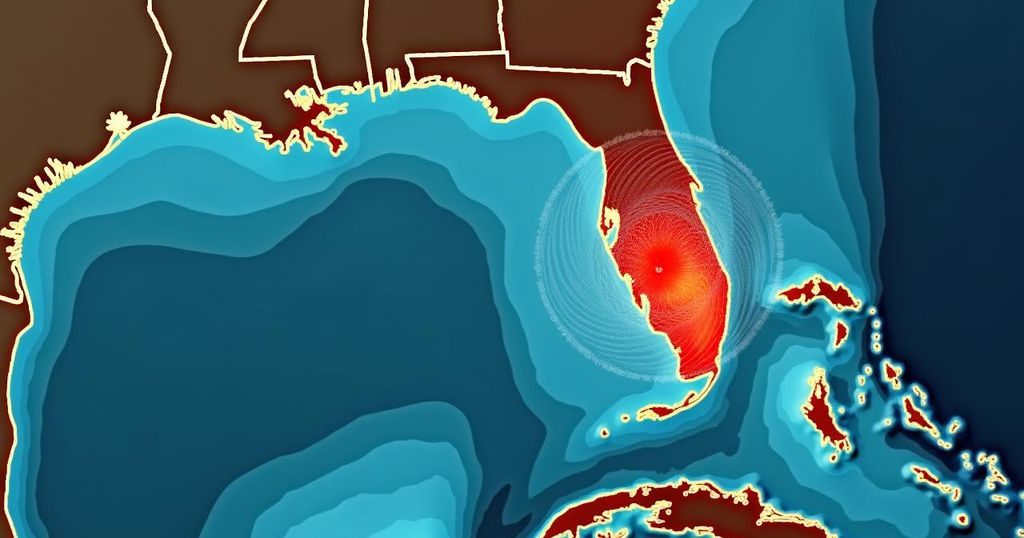Hurricane Helene’s Devastating Path Through Florida and Georgia
Hurricane Helene made landfall in Florida as a Category 4 storm, resulting in extensive power outages impacting over 4.5 million residents in multiple states and causing at least 22 deaths. The storm weakened to a tropical storm as it moved inland but continued to cause significant flooding and evacuations across affected areas.
Hurricane Helene struck the Big Bend region of Florida on Thursday evening, making landfall as a formidable Category 4 storm. The hurricane brought with it catastrophic winds reaching 140 mph and subsequently led to significant power outages affecting over 4.5 million residents across six states, including Tennessee and Virginia. Reports indicate at least 22 fatalities tied to the storm’s destruction. Following its initial impact in Florida, Hurricane Helene progressed northward into Georgia and the Carolinas, where it continued to unleash heavy rainfall resulting in severe flooding. By Friday morning, the storm had weakened to a tropical storm status with sustained winds of 45 mph, as indicated by the National Hurricane Center. At that time, Helene was situated approximately 30 miles southwest of Bryson City, North Carolina. In Newport, Tennessee, local authorities issued evacuation orders due to the failure of the Waterview Dam, triggered by rising waters from the storm. Similar evacuations were directed in Cocke County along the Pigeon and French Broad rivers. Flooding concerns also escalated in North Carolina with warnings regarding the potential failure of the Lake Lure Dam. Hurricane Helene is notable as it marks the first Category 4 storm to impact the Big Bend area since 1851 and is recognized as the 22nd Category 4 hurricane in the United States since 1920. Historical data reveals a worrying trend, as past hurricanes have inflicted billions of dollars in damage due to flooding, structural destruction, and extensive power outages. As assessments continue, the full scope of the destruction wrought by Helene remains uncertain, underscoring the storm’s profound impact on the affected regions.
The occurrence of Hurricane Helene has become a significant event in meteorological history, particularly recognized for its classification as a Category 4 hurricane, which denotes sustained wind speeds capable of causing catastrophic damage. The Big Bend region of Florida, typically less impacted by such severe storms, witnessed a rare and dangerous landfall, marking it as a critical point of study for the effects of climate change and hurricane tracking. Historical comparisons to past hurricanes provide context for understanding the potential for catastrophic outcomes and the importance of preparedness for coastal and inland communities alike. The significant power outages and fatal consequences associated with this storm emphasize the urgent need for effective response strategies in the aftermath of extreme weather phenomena.
Hurricane Helene has left a trail of destruction across Florida and beyond, with its powerful winds and torrential rains resulting in widespread power outages and loss of life. The storm’s classification as a Category 4 event accentuates its unprecedented impact, particularly within regions historically less familiar with such intensity. With recovery efforts underway, the full extent of damage caused by Helene serves as a stark reminder of the fragility of infrastructure in the face of natural disasters, necessitating ongoing assessments and improvements in disaster preparedness and response.
Original Source: www.usatoday.com




Post Comment